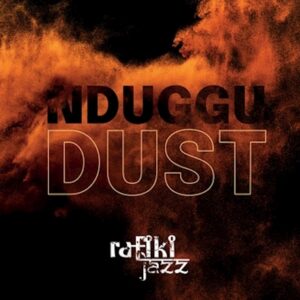
Rafiki Jazz is een collectief van wereldse musici die hun lokale muzikaliteit bundelen op het nieuwe album Induggu Dust.
English version below
Veel instrumenten refereren aan een land of streek. Zo is de kora (harp) een typisch instrument uit West-Afrika, de steel drums uit Trinidad, de bansuri (fluit) en tabla (handtrommel) uit India, de berimbau (een-snarig percussie-instrument) uit Brazilië, de ney (fluit) uit Turkije en de ûd (de luit) uit de Oriënt. Op al deze instrumenten wordt muziek gespeeld die typisch is voor het land van herkomst en karakteristiek voor de muziek die er vandaan komt. De veelzijdige band Rafiki Jazz voegt deze instrumenten samen in een hemelsbrede line-up en creëert daarmee een werelds metier. Het repertoire wordt een mixing-melting-pot van stijlen, gespeeld op instrumenten die van oorsprong niet in die stijlen voorkwamen. Hierdoor ontstaat een zeer avontuurlijke mengvorm. Deze wijze van musiceren is vergelijkbaar met de muziek in de documentaire From Mao to Mozart uit 1981 van violist Isaac Stern. Hierin is een werk te horen van Vivaldi, gespeeld op Chinese instrumenten. De muziek blijft onomstotelijk Vivaldi, maar de klankkleur is onmiskenbaar Chinees. Een werkelijk magisch mix van twee culturen. Maar Rafiki Jazz gaat nog een stapje verder met traditioneel en nieuw gecomponeerd werk. Zo opent de CD met een India’s georiënteerde compositie Naalaikku Nalla Naal van Vijay Venkat waarin naast tabla, bansuri en Indiase zang ook steel drums (unisono met de bansuri) en kora te horen zijn. Klinkt in Tum na Aaye een Cubaans ritme tegen een Pakistaanse achtergrond, prachtig gezongen door Sarah Yasseen. Fascinerend zijn ook het Arab-Indiase Omkoth Ma’ai en het West-Afrikaanse Bani waarop de steel drums en de bansuri klinken. Ja, en zo kan ik nog wel even doorgaan, maar luister zelf naar Nduggu Dust; ontdek en geniet. Een meesterlijk mooi album!
English version
Rafiki Jazz is a band of excellent musicians who combine their local musicality on the new album Induggu Dust.
Many instruments refer to a country or region. The kora (harp) is a typical instrument from West Africa, the steel drums from Trinidad, the bansuri (flute) and tabla (hand drum) from India, the berimbau (one-stringed percussion instrument) from Brazil, the ney ( flute) from Turkey and the ûd (the lute) from the Orient. On all these instruments music is played that is typical for the country and characteristic of the music that comes from that country. The versatile band Rafiki Jazz combines these instruments in a sky-wide line-up and thus creates a cosmopolitan metier. The repertoire becomes a mixing-melting pot of styles, played on instruments that were not originally in those styles. This creates a very adventurous mixture. This way of making music reminds me of the 1981 documentary From Mao to Mozart by violinist Isaac Stern. In this film there’s music composed by Vivaldi but played on Chinese instruments. The music is undeniably Vivaldi, but the timbre is unmistakably Chinese. A truly magical blend of two cultures. But Rafiki Jazz goes one step further with traditional and newly composed work. For example, the CD opens with an India-oriented composition Naalaikku Nalla Naal by Vijay Venkat in which, in addition to tabla, bansuri and Indian vocals, steel drums (unison with the bansuri) and kora is added. In Tum na Aaye sounds a Cuban rhythm in a Pakistani background, beautifully sung by Sarah Yasseen. Fascinating are also the Arab-Indian Omkoth Ma’ai and the West African Bani on which the steel drums and the bansuri are in the line-up. Yes, and I could go on and on, but listen for yourself; discover and enjoy the masterfully beautiful album Nduggu Dust,!
- Rafiki Jazz: Nduggu Dust (Konimusic)
© Mattie Poels.

Geen reacties